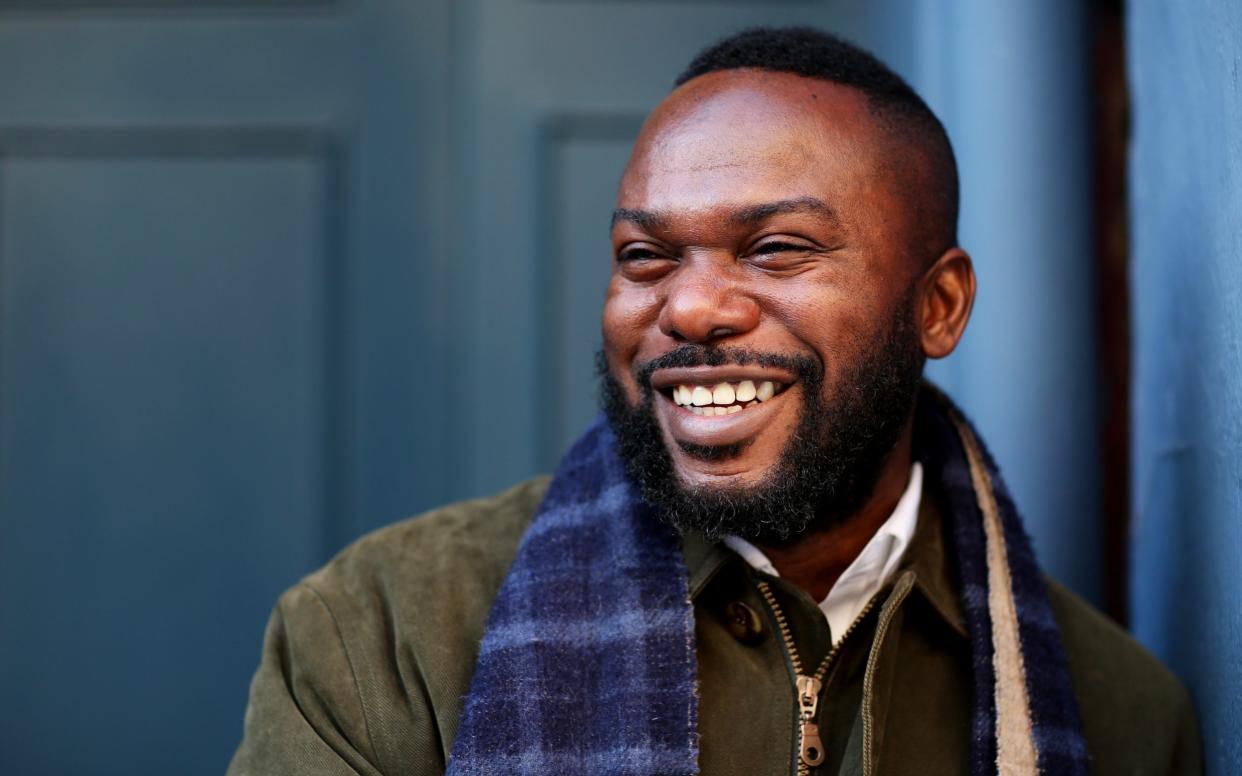TS Eliot Prize winner Jason Allen-Paisant: ‘My Jamaican grandmother would sing me Rule, Britannia’

After winning the richest award in British poetry on Monday – the £25,000 TS Eliot Prize – Jason Allen-Paisant couldn’t sleep for excitement, and found himself pacing the dark, freezing London streets, in “a confused vortex of emotions”.
It’s a momentous week for the 43-year-old poet and critic. We sit down to talk on Tuesday, and as soon as our conversation is over he’s off to catch a flight to Ethiopia, to meet his estranged father for the very first time.
His father’s absence runs through his second book Self-Portrait as Othello, which has now won both the UK’s major poetry awards, having picked up a Forward Prize last year. It weaves together an imaginative response to Othello (“What Shakespeare did not write about. The story he was unable to tell”) with Allen-Paisant’s own life story, which takes him from a small Jamaican farm, via Paris, to Oxford, where he took a doctorate, dressing in tweed and doing his best to blend in with “the public school boys”.
Now a lecturer at the University of Manchester, Allen-Paisant grew up in rural Coffee Grove, Jamaica – “an unspoilt place,” he says. His father had “never been in the picture”, so he was initially raised by his “Mama” – who he later learnt was actually his grandmother. At the age of five, he was dropped off at the house of a woman who turned out to be his biological mother, without a word of explanation. “It was brutal,” he says.
“In my milieu, in my family environment, people don’t talk about things… There is this odd kind of muteness. People endure things and don’t talk about them. We bear, bear bear, we bear, we get along with it. It’s sort of the black peasant restraint.”
He spent the rest of his childhood moving between his grandmother and mother’s homes. It was his grandmother who kindled his love of poetry. “We didn’t have a lot of books around. Because of the people we were, in the kind of district I grew up with, we might have one letter – C – of the Encyclopedia Britannica on the bookshelf. We certainly had the Bible, but it wasn’t a bookish house. But it’s funny how people can still love knowledge, and transmit that.”
She would recite poems, Bible verses and song lyrics for him, “singing everything from the hymns to Rule, Britannia… I think those things nourish your imagination. Just the line ‘Rule, Britannia! Britannia rules the waves’ was a big thing for her, because that’s what she sang going to school. She grew up in the empire – she would sing these songs, and somehow they exerted a fascination.” He is, of course, aware of the irony of this, as anyone familiar with his work would realise.

At school, he discovered recital was his “superpower”. If he read poems by Wordsworth or the Romantics aloud, he could hold the whole class’s attention. “I loved words, words in my mouth, the feel of words coming out of my body.” Over a cup of tea, he suddenly launches into Walter de la Mare’s The Listeners (“‘Is there anybody there?’ said the Traveller…”). He hasn’t lost that “superpower”: when he recited from Self-Portrait as Othello to a thousand people at the Royal Festival Hall on Sunday night, you could have heard a pin drop.
It was at school that he first read Othello. “I felt – weirdly and eerily – how wonderful for Shakespeare to write a play where the protagonist was a dark-skinned foreigner!” He points out that we still see vestiges of Early Modern Moorish culture in Europe – the architecture of the Alhambra in Spain, those rings with “miniature heads of turbaned Moors in black marble” still popular with Venetian jewellers – but rarely read about their lives.
“I was glad that this play existed, because I felt like he was giving me a glimpse into a world that’s not recorded in history books with any care or depth.” But, at the same time, Othello feels more like “a container for a certain set of ideas” than a three-dimensional character.
In the book, he asks: “Why does [Othello] offer up so easy a template for the shame produced in my body?” One poem ventriloquises a family gossiping about their white daughter’s relationship with a black man, just as Desdemona’s did about hers, as if to show how little has changed in four centuries: “they think / it’s going to pass this fascination with the dark-skinned boy surely / she’ll come around find someone of her kind when she is sated.” The last four words come straight from the play – they’re Iago’s.
Allen-Paisant fell in love with French at school, and moved to Paris for a post-graduate degree. It was there, at 5.30am in the morning outside a nightclub, that he saw a woman so beautiful he felt he had to cross the road to introduce himself to her. Lucile Paisant (they combined their surnames) is now his wife; they have two children, aged three and five, and live in Leeds.
Having a family that made him want to connect with his father. “When you’ve got young children, you think about lineage, connections.” How did they get back in touch? He’s a little cagey, deflecting questions about that side of his family’s story. He spoke to his father on the phone some years ago, and wrote to him, but their correspondence was broken off by “factors that I won’t get into.” Perhaps it’s too personal to share, or perhaps he’s just saving it for his autobiography (out next year, from a branch of Penguin Random House).
I mention that The Telegraph is currently running its own poetry competition, and ask if he has any tips for readers trying their hand at poetry. “Relax, don’t overthink it. It’s not going to be a final draft. Give yourself some grace - and in the future you will be thankful that you wrote it.”
Self-Portrait as Othello is published by Carcanet at £12.99. To order your copy call 0844 871 1514 or visit Telegraph Books


